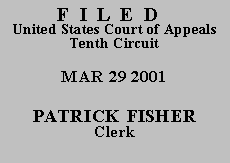

| DOUG E. JONES, |
|
| v. | |
| STEVE KAISER, Warden, |
determination of this appeal. See Fed. R. App. P. 34(a)(2)(c); 10th Cir. R. 34.1(G). The case is therefore ordered submitted without oral argument.
Doug E. Jones, a prisoner in the custody of the Oklahoma Department of Corrections proceeding pro se, seeks to appeal the district court's dismissal of his habeas petition, filed pursuant to 28 U.S.C. § 2254. The district court ruled that, under the one-year statute of limitations set forth in 28 U.S.C. § 2244(d), Mr. Jones's petition was untimely.
The record indicates that Mr. Jones was convicted after a jury trial of possession of a controlled dangerous substance after former conviction of a felony. After the Mayes County District Court sentenced him to 101 years' imprisonment, he appealed to the Oklahoma Court of Criminal Appeals, which affirmed his conviction and sentence on November 26, 1996. On May 12, 1997, the United States Supreme Court denied Mr. Jones's petition for a writ of certiorari.
Mr. Jones filed an application for post-conviction relief in the state district court on February 17, 1998. After that court denied relief, he again appealed to the Oklahoma Court of Criminal Appeals. On December 18, 1998, that court affirmed the denial of post-conviction relief.
Mr. Jones subsequently filed his federal habeas petition on September 9, 1999. In ruling that the petition was untimely, the district court reasoned as follows: Mr. Jones' state-court conviction became final on May 12, 1997, when the Supreme Court denied his petition for certiorari. Pursuant to 28 U.S.C. § 2244(d)(1), Mr. Jones had until May 12, 1998, to file his federal habeas petition. Under § 2244(d)(2), the statute of limitations was tolled during the pendency of his state post-conviction claim (from February 17, 1997, until December 18, 1998). Thus, after the Oklahoma Court of Criminal Appeals affirmed the denial of post-conviction relief (on December 18, 1998), eighty-five days remained on the one-year statute of limitations. Accordingly, Mr. Jones had until March 13, 1999, to file his federal habeas petition.
Because Mr. Jones's federal habeas petition was not filed until September 9, 1999, approximately six months beyond the deadline, the district court ruled that it should be dismissed as untimely. The court further concluded that equitable tolling was not warranted.
In his application for a certificate of appealability, Mr. Jones does not challenge the district court's conclusion that his habeas petition was not filed within the one-year deadline established by § 2244(d)(1). However, as in the district court proceedings, he contends that the statute should be equitably tolled because he received ineffective assistance of counsel in the state post-conviction proceedings. He also maintains that he is actually innocent. We are not convinced by Mr. Jones's arguments.
As the district court noted, there is no constitutional right to counsel in post-conviction proceedings. See Pennsylvania v. Finley, 481 U.S. 551, 555 (1987). As a result, the fact that a habeas petitioner was unaware of the statute of
limitations is not sufficient to warrant equitable tolling. See Miller v. Marr, 141 F.3d 976, 978 (10th Cir. 1998). Although equitable tolling may be appropriate when a habeas petitioner diligently pursues his claims and the delay is caused by circumstances beyond his control, there is no indication that such factors are present. In particular, Mr. Jones has failed to explain why he did not file his federal habeas petition until September 9, 1999, more than nine months after the conclusion of state post-conviction proceedings on December 18, 1998.
As to actual innocence, Mr. Jones notes that the evidence at trial indicated that the syringe in which law enforcement officials discovered methamphetamine was placed on a dresser under his wife's control. Mr Jones does acknowledge that his wife testified that he was involved in drug trafficking and that he had access to the syringe. However, he cites a state statute, Okla. Stat. tit. 22 § 742, that provides that the testimony of accomplices must be corroborated.
These arguments also do not establish grounds for equitable tolling. See Lucidore v. New York State Div. of Parole, 209 F.3d 107, 114 (2d Cir. 2000) ("In order to demonstrate actual innocence in a so-called collateral proceeding, a petitioner must present new reliable evidence that was not presented at trial and show that it is more likely than not that no reasonable juror would have found [him] guilty beyond a reasonable doubt.") (internal quotations omitted, alteration in original).
The sections of the trial transcript discussed by Mr. Jones indicate only that the case against him was circumstantial; they do not show that he was innocent. Moreover, the Oklahoma statute regarding accomplice testimony does not establish that the state infringed his federal constitutional rights by relying on his wife's testimony. See Scrivner v. Tansy, 68 F.3d 1234, 1239 (10th Cir. 1995) (discussing cases holding that "a jury may convict based on the uncorroborated testimony of a co-conspirator so long as the testimony is not incredible on its face and is otherwise capable of establishing guilt beyond a reasonable doubt" and that "state laws requiring corroboration do not implicate constitutional concerns that can be addressed on habeas review") (internal quotation marks and citations omitted).
Accordingly, we DENY Mr. Jones's motion to proceed in forma pauperis, DENY his request for a certificate of appealability for substantially the same reasons set forth in the district court's order, and DISMISS this appeal.
Entered for the Court,
Robert H. Henry
Circuit Judge
*. This order and judgment is not binding precedent, except under the doctrines of law of the case, res judicata, and collateral estoppel. The court generally disfavors the citation of orders and judgments; nevertheless, an order and judgment may be cited under the terms and conditions of 10th Cir. R. 36.3.